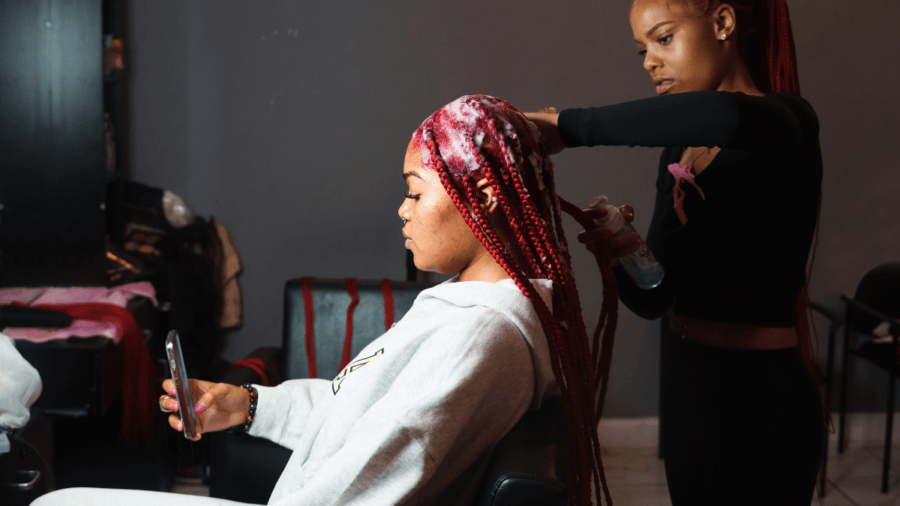For many Black women, protective styles like braids, twists, and locs are more than just a beauty choice—they’re a cultural staple and a way to safeguard natural hair from daily manipulation. But what if the very thing meant to “protect” us is actually causing harm?
A recent Consumer Reports investigation has dropped some serious revelations, revealing that many popular synthetic braiding hair brands are laced with toxic chemicals, including carcinogens, lead, and volatile organic compounds (VOCs). And yes, these are chemicals that can lead to serious health risks—including cancer and neurological damage. So, are synthetic braids really worth it? Let’s break it down.
What’s in Our Braiding Hair? The Toxic Truth
Consumer Reports tested ten popular synthetic braiding hair brands and found some disturbing results. The brands tested include:
- Sensationnel
- Magic Fingers
- Shake-N-Go
- X-Pression
- Sassy Collection
The investigation found potentially hazardous chemicals in every single brand tested. Researchers detected lead in nine out of ten brands, along with benzene (a known carcinogen) and other volatile organic compounds (VOCs). If that’s not alarming enough, these chemicals can be absorbed through the scalp or released into the air when we dip our braids in hot water—a common practice to set synthetic styles.
What Does This Mean for Our Health?
The presence of these chemicals is not just an inconvenience—it’s a health risk. Here’s what we’re dealing with:
- Benzene → A well-documented carcinogen that has been linked to an increased risk of cancer.
- Lead → Exposure can cause neurological damage, developmental issues, and even infertility.
- VOCs → When synthetic braids are dipped in hot water, VOCs are released into the air, which can cause respiratory irritation and long-term lung issues.
We already know that beauty standards often come at a cost, especially for Black women, but should our health really be on the line for a fresh set of braids?
The Industry’s Response: Are There Safer Alternatives?
With more awareness around these dangers, there is a growing demand for safer options. One brand that’s stepping up is Rebundle, which offers plant-based, biodegradable braiding hair that’s free from harmful chemicals. But let’s be real—why aren’t more mainstream brands being held accountable?
Synthetic braiding hair companies continue to profit off Black consumers while putting our health at risk. Where are the regulations? Where’s the transparency? And why do we have to do the research to make sure our beauty choices aren’t literally poisoning us?
What Can We Do Right Now?
Until the beauty industry starts putting our health before their profits, we need to take matters into our own hands. Here are some ways to protect yourself while still rocking your favorite styles:
Limit Exposure → Give your hair and scalp breaks between installations to reduce chemical exposure.
Pre-Treat Synthetic Hair → Some stylists recommend soaking braiding hair in an apple cider vinegar rinse before installation to remove some of the chemical residue—though scientific proof is limited.
Stay Informed → Check product recalls and read up on hair safety before purchasing your next batch of braiding hair.
Support Safe Brands → Brands like Rebundle are working to make protective styles truly protective—not just for our hair but for our health.
Final Thoughts: Is It Time for a Change?
This Consumer Reports investigation should be a wake-up call for the beauty industry. Black women deserve better—we shouldn’t have to choose between protecting our hair and protecting our health.
So, we have to ask—are synthetic braids really worth it? Or is it time for the industry to step up and give us the safe, non-toxic alternatives we deserve?
What do you think? Have you experienced any irritation or health issues from synthetic braiding hair? Drop a comment below and let’s keep the conversation going.
And for more beauty, fashion, and industry news, follow MEFeater on Twitter, Instagram, Facebook, and Pinterest!
